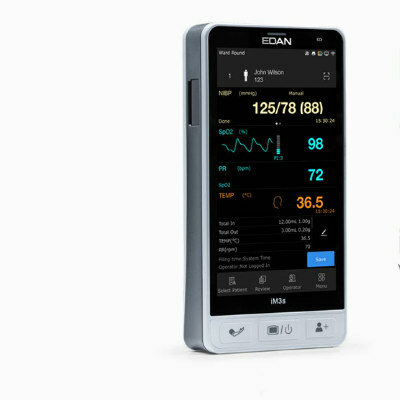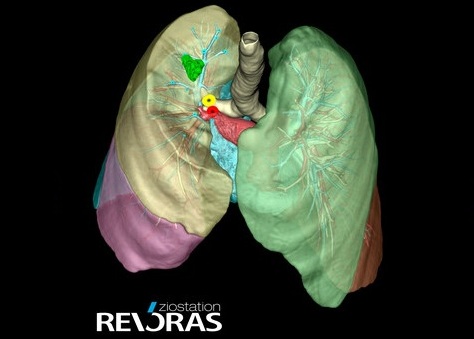Korean Biopharmaceutical Firm Celltrion Launches Both Antigen and Antibody Testing Kits in the US
|
By HospiMedica International staff writers Posted on 13 Aug 2020 |
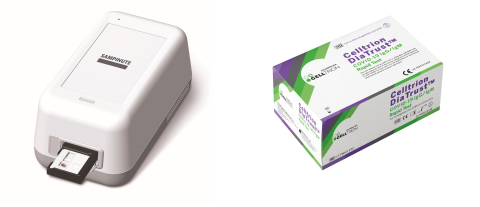
SAMPINUTE™ COVID-19 Antigen MIA (left) and DiaTrust™ COVID-19 IgG/IgM Rapid Test (Photo courtesy of Celltrion)
Celltrion Group (Incheon, Korea) has launched two rapid COVID-19 testing kits, SAMPINUTE COVID-19 Antigen MIA for detection of SARS-CoV-2 antigen, and DiaTrust COVID-19 IgG/IgM Rapid Test for detection of SARS-CoV-2 IgG/IgM antibody in the US.
SAMPINUTE COVID-19 Antigen MIA is an electrochemical immunoassay test for detection of SARS-CoV-2 antigen from nasopharyngeal swab samples, composed of one time use test cartridges and a portable analyzer. DiaTrust COVID-19 IgG/IgM Rapid Test is a one-step in-vitro diagnostic test based on immunochromatographic assay designed for the rapid detection of antibodies of the novel coronavirus in healthcare settings. Both the rapid tests kits have shown a reliable performance and promising clinical trial results. SAMPINUTE COVID-19 Antigen MIA has a sensitivity of 94% and a specificity of 100%, with time to results within 10 minutes. DiaTrust COVID-19 IgG/IgM Rapid Test has also shown a reliable performance with 96% positive percent agreement and 98.67% negative percent agreement for IgM, 92% positive percent agreement and 100% negative percent agreement for IgG. The test has a turnaround time of 15 minutes.
“Celltrion has been striving to bring the tests into the US. The need for more accessible, affordable, and most importantly, rapid diagnostic testing will grow, as the daily activities are coming back, and the economy is opening up again,” a Celltrion representative stated. “With the short turnaround time and promising performance of the sensitivity and specificity results, Celltrion is confident that both SAMPINUTE COVID-19 Antigen MIA and DiaTrust COVID-19 IgG/IgM Rapid Test will add great value to healthcare providers in screening patients and keeping communities safe.”
Related Links:
Celltrion Group
SAMPINUTE COVID-19 Antigen MIA is an electrochemical immunoassay test for detection of SARS-CoV-2 antigen from nasopharyngeal swab samples, composed of one time use test cartridges and a portable analyzer. DiaTrust COVID-19 IgG/IgM Rapid Test is a one-step in-vitro diagnostic test based on immunochromatographic assay designed for the rapid detection of antibodies of the novel coronavirus in healthcare settings. Both the rapid tests kits have shown a reliable performance and promising clinical trial results. SAMPINUTE COVID-19 Antigen MIA has a sensitivity of 94% and a specificity of 100%, with time to results within 10 minutes. DiaTrust COVID-19 IgG/IgM Rapid Test has also shown a reliable performance with 96% positive percent agreement and 98.67% negative percent agreement for IgM, 92% positive percent agreement and 100% negative percent agreement for IgG. The test has a turnaround time of 15 minutes.
“Celltrion has been striving to bring the tests into the US. The need for more accessible, affordable, and most importantly, rapid diagnostic testing will grow, as the daily activities are coming back, and the economy is opening up again,” a Celltrion representative stated. “With the short turnaround time and promising performance of the sensitivity and specificity results, Celltrion is confident that both SAMPINUTE COVID-19 Antigen MIA and DiaTrust COVID-19 IgG/IgM Rapid Test will add great value to healthcare providers in screening patients and keeping communities safe.”
Related Links:
Celltrion Group
Latest COVID-19 News
- Low-Cost System Detects SARS-CoV-2 Virus in Hospital Air Using High-Tech Bubbles
- World's First Inhalable COVID-19 Vaccine Approved in China
- COVID-19 Vaccine Patch Fights SARS-CoV-2 Variants Better than Needles
- Blood Viscosity Testing Can Predict Risk of Death in Hospitalized COVID-19 Patients
- ‘Covid Computer’ Uses AI to Detect COVID-19 from Chest CT Scans
- MRI Lung-Imaging Technique Shows Cause of Long-COVID Symptoms
- Chest CT Scans of COVID-19 Patients Could Help Distinguish Between SARS-CoV-2 Variants
- Specialized MRI Detects Lung Abnormalities in Non-Hospitalized Long COVID Patients
- AI Algorithm Identifies Hospitalized Patients at Highest Risk of Dying From COVID-19
- Sweat Sensor Detects Key Biomarkers That Provide Early Warning of COVID-19 and Flu
- Study Assesses Impact of COVID-19 on Ventilation/Perfusion Scintigraphy
- CT Imaging Study Finds Vaccination Reduces Risk of COVID-19 Associated Pulmonary Embolism
- Third Day in Hospital a ‘Tipping Point’ in Severity of COVID-19 Pneumonia
- Longer Interval Between COVID-19 Vaccines Generates Up to Nine Times as Many Antibodies
- AI Model for Monitoring COVID-19 Predicts Mortality Within First 30 Days of Admission
- AI Predicts COVID Prognosis at Near-Expert Level Based Off CT Scans
Channels
Artificial Intelligence
view channel
Innovative Risk Score Predicts Heart Attack or Stroke in Kidney Transplant Candidates
Heart researchers have utilized an innovative risk assessment score to accurately predict whether patients being evaluated for kidney transplants are at risk for future major cardiac events, such as a... Read more
AI Algorithm Detects Early-Stage Metabolic-Associated Steatotic Liver Disease Using EHRs
Liver disease, which is treatable when detected early, often goes unnoticed until it reaches advanced stages. Metabolic-associated steatotic liver disease (MASLD), the most prevalent form of liver disease,... Read moreCritical Care
view channel
Digital Heart Twin Improves Diagnosis and Treatment of Cardiac Arrhythmias
Millions of individuals around the globe suffer from cardiac arrhythmias. Traditionally, electrocardiography (ECG) has been used to detect premature ventricular contractions (PVCs), one of the most common... Read more
First-Of-Its-Kind AI-Powered Probability Scoring System Assesses Heart Failure with Preserved Ejection Fraction
Heart failure with preserved ejection fraction (HFpEF) is one of the most difficult types of heart failure to diagnose due to the intricate interaction between various clinical and echocardiographic factors.... Read more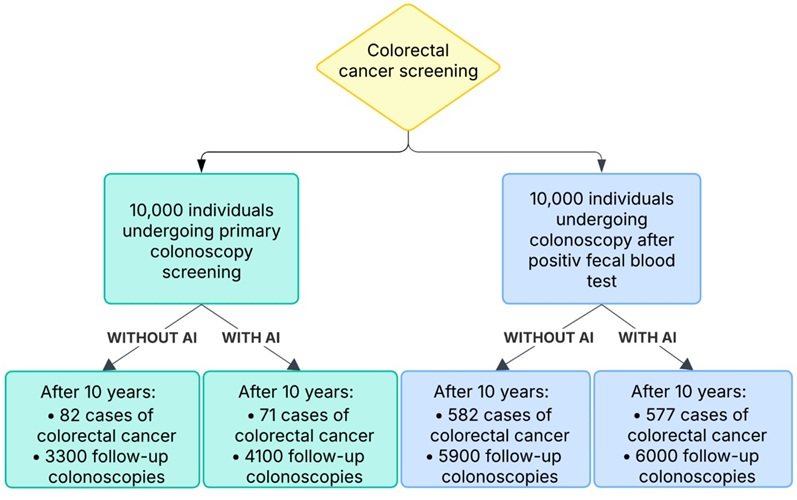
AI-Assisted Colonoscopy Detects More Polyps but Has Modest Effect on Cancer Risk
Colorectal cancer is among the most common cancers in the Western world. Currently, screening is performed using a test that detects blood in the stool (FIT screening). If the test identifies a certain... Read more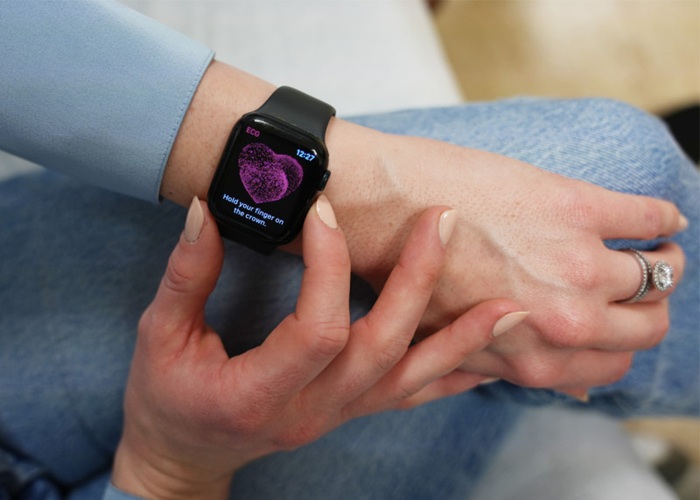
Wearables Could Reduce Need for Continuous Blood Thinners in Patients with Atrial Fibrillation
Atrial fibrillation (AFib) is the most prevalent heart arrhythmia, affecting over 5 million individuals in the United States, with projections suggesting that number could rise to 12.1 million by 2030.... Read moreSurgical Techniques
view channel
Minimally Invasive Valve Repair Reduces Hospitalizations in Severe Tricuspid Regurgitation Patients
The tricuspid valve is one of the four heart valves, responsible for regulating blood flow from the right atrium (the heart's upper-right chamber) to the right ventricle (the lower-right chamber).... Read more
Tiny Robotic Tools Powered by Magnetic Fields to Enable Minimally Invasive Brain Surgery
Over the past few decades, there has been a significant surge in the development of robotic tools designed to facilitate minimally invasive surgeries, improving recovery times and patient outcomes.... Read morePatient Care
view channel
Portable Biosensor Platform to Reduce Hospital-Acquired Infections
Approximately 4 million patients in the European Union acquire healthcare-associated infections (HAIs) or nosocomial infections each year, with around 37,000 deaths directly resulting from these infections,... Read moreFirst-Of-Its-Kind Portable Germicidal Light Technology Disinfects High-Touch Clinical Surfaces in Seconds
Reducing healthcare-acquired infections (HAIs) remains a pressing issue within global healthcare systems. In the United States alone, 1.7 million patients contract HAIs annually, leading to approximately... Read more
Surgical Capacity Optimization Solution Helps Hospitals Boost OR Utilization
An innovative solution has the capability to transform surgical capacity utilization by targeting the root cause of surgical block time inefficiencies. Fujitsu Limited’s (Tokyo, Japan) Surgical Capacity... Read more
Game-Changing Innovation in Surgical Instrument Sterilization Significantly Improves OR Throughput
A groundbreaking innovation enables hospitals to significantly improve instrument processing time and throughput in operating rooms (ORs) and sterile processing departments. Turbett Surgical, Inc.... Read moreHealth IT
view channel
Printable Molecule-Selective Nanoparticles Enable Mass Production of Wearable Biosensors
The future of medicine is likely to focus on the personalization of healthcare—understanding exactly what an individual requires and delivering the appropriate combination of nutrients, metabolites, and... Read more
Smartwatches Could Detect Congestive Heart Failure
Diagnosing congestive heart failure (CHF) typically requires expensive and time-consuming imaging techniques like echocardiography, also known as cardiac ultrasound. Previously, detecting CHF by analyzing... Read morePoint of Care
view channel
Handheld, Sound-Based Diagnostic System Delivers Bedside Blood Test Results in An Hour
Patients who go to a doctor for a blood test often have to contend with a needle and syringe, followed by a long wait—sometimes hours or even days—for lab results. Scientists have been working hard to... Read more
Smartphone-Enabled, Paper-Based Quantitative Diagnostic Platform Transforms POC Testing
Point-of-care diagnostics are crucial for public health, offering rapid, on-site testing that enables prompt diagnosis and treatment. This is especially valuable in remote or underserved regions where... Read moreBusiness
view channel
Expanded Collaboration to Transform OR Technology Through AI and Automation
The expansion of an existing collaboration between three leading companies aims to develop artificial intelligence (AI)-driven solutions for smart operating rooms with sophisticated monitoring and automation.... Read more









